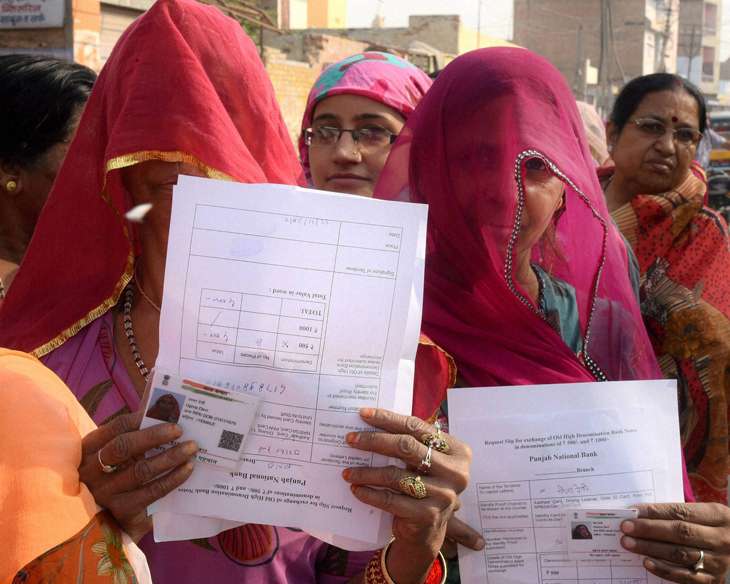Demonetisation and its discontents: why black money isn't going anywhere

To begin with, some definitions. Money, textbooks tell us, is a medium of exchange and a store of value. While ideal for transactions, money is not always the best way of storing value -- gold, gemstones, real estate, art, the list of alternate stores of value is long and the principal difference between them is in the degree of liquidity they offer and the capital appreciation they are prone to.
Transactions
Legal transactions - like buying groceries - that are taxable, but not so declared to the appropriate authorities, generate 'black' money - essentially money not accounted for as required by extant laws. Illegal transactions are of course entirely 'black'- party-goers buying cocaine, for example.
Transactions by illegals - foreign terrorists buying anything at all - using forged currency are in a different category and shall be considered separately.
Consider a lawyer who charges a client Rs 50 lakh, accepts half by cheque, declares it as income, takes the rest in cash and does not declare it as income. The twenty five lakhs of 'black' money can be stuffed in a mattress or used to buy something, say a flat, which is paid for partly by cheque and partly by cash, i.e. in 'black'.

The builder in turn, banks the cheque and stores the black money in cash and uses it to pay his building costs - in black - or takes it out as his income - in black - or a bit of both. There is thus a black component in a series of otherwise legitimate transactions; a parallel flow of cash which has not been accounted for and taxed appropriately.
The motive for 'black' money in otherwise legitimate transactions such as representing a client, buying a house, building a residential colony etc etc etc, boils down to a fundamental reluctance to pay taxes, direct and indirect.
This may stem from some deep seated hangover from feudal times when the state was exploitative and citizens considered its exorbitant and arbitrary demands fundamentally illegitimate; or else it may simply be some citizens' perception of the taxation system as being excessively burdensome, irrationally complex and patently corrupt; or else, it may be simple greed. It is usually a varying combination of the above.
When the 'black' component in any activity is high, the convenience offered by large denomination currency notes is obvious - ease of transportation, storage and accountal.
The impact of demonetisation of large denomination notes on the 'black' economy needs to be seen in this context.
Will demonetisation work?
It is highly unlikely that replacing one set of notes by another will, by itself, change individual notions of the legitimacy of the state's tax demands or make any impact on individual greed. Thus the factors underlying people's reluctance to pay taxes will not be affected by demonetisation and therefore the 'fundamentals' of the black economy are unlikely to be altered by this measure.
All those who, at the time of demonetisation, had huge and not easily explainable stocks of large denomination currency notes will be impacted negatively. The precise manner in which things will play out will probably never be known - what arrangements were made by whom, will forever be shrouded in secrecy. But there is likely to be a negative effect of considerable magnitude on those in this category who had no advance information of coming events.
That said, what happens when the dust has settled, new notes come into circulation and denominations larger than before are conveniently provided? Will we become less greedy and more accepting of the state's taxation demands, its established corruption, waste and incompetence? Demonetisation is unlikely to have such an impact.
Lawyers will not reduce their fees, nor will doctors; builders will build houses and people will buy them - the cycle will continue as before unless other very serious and difficult reforms are undertaken. Many economists of various persuasions have listed the reforms required to the taxation structure and to economic institutions for a transformation of our economic culture.
The problem is not lack of knowledge about what to do but the political will to do what is needed regardless of established vested interests and political convenience. Low hanging fruit - measures that essentially require a central fiat and have huge political benefits attached - are easy to pick. Not so easy are things like cleaning up electoral funding, rationalizing tax structures, taxing agriculture, eliminating subsidies, reforming labour laws ..........., the list goes on and on.
To put it another way, trashing a few truckloads of illicit hooch does not eliminate bootlegging in a prohibition economy, it just gives it a temporary, even if significant, setback. Fundamental parivartan requires serious measures. Slogans and tokens are simply not enough. We've been hearing 'Garibi hatao' and its equivalents for many, many years now to little effect.
As regards illegals using counterfeit currency, the impact of demonetization is obvious and its significance depends upon the volume of such farji currency in circulation.
The dacoits, drug smugglers and others of that ilk with large stashes of high denomination currency will lose what they cannot launder and that will be a setback to them - the bad guys - but will it make them give up dacoity or smuggling given that the marginal rate of return on their illegal activities is unlikely to be changed by demonetisation?
Payment habits
Comments have been made about the effect of demonetization on the use of plastic and other non-cash payment systems. It is contended that this measure will push consumers away from cash to plastic for both bricks and mortar and online transactions. This is a non-sequitur.
Payment habits are not easily changed and replacing one set of currency notes by another will not have any effect in this regard. The fear of the unfamiliar is very fundamental and money matters are serious; hence the reluctance of consumers to shift from cash to plastic, even for across the counter transactions.
As for online transactions, every e-retailer knows that even educated tech savvy persons are reluctant to pay online: horror stories of cyber-crime and sheer unfamiliarity with online payment systems is the basis of this reluctance.
The use of expensive and cumbersome 'cash on delivery' modes of payment attests to the reality of this problem. Demonetisation is not going to change customer preferences in this regard - only time and increasing familiarity will.
Retailers tend to discourage plastic usage in any case - from booze shops to multinational car showrooms most retailers charge a fee for plastic payment - so much for moving away from cash!
In conclusion, demonetisation is likely to hit some 'bad' guys significantly - criminals, terrorists and big ticket black money holders, and that includes politicians and political parties.
It is unlikely to alter any 'fundamentals' that will bring about basic changes in economic motivation and the functioning of the economy, including the 'black' economy.
First published: 12 November 2016, 7:40 IST





![BJP's Kapil Mishra recreates Shankar Mahadevan’s ‘Breathless’ song to highlight Delhi pollution [WATCH] BJP's Kapil Mishra recreates Shankar Mahadevan’s ‘Breathless’ song to highlight Delhi pollution [WATCH]](https://images.catchnews.com/upload/2022/11/03/kapil-mishra_240884_300x172.png)

![Anupam Kher shares pictures of his toned body on 67th birthday [MUST SEE] Anupam Kher shares pictures of his toned body on 67th birthday [MUST SEE]](https://images.catchnews.com/upload/2022/03/07/Anupam_kher_231145_300x172.jpg)






